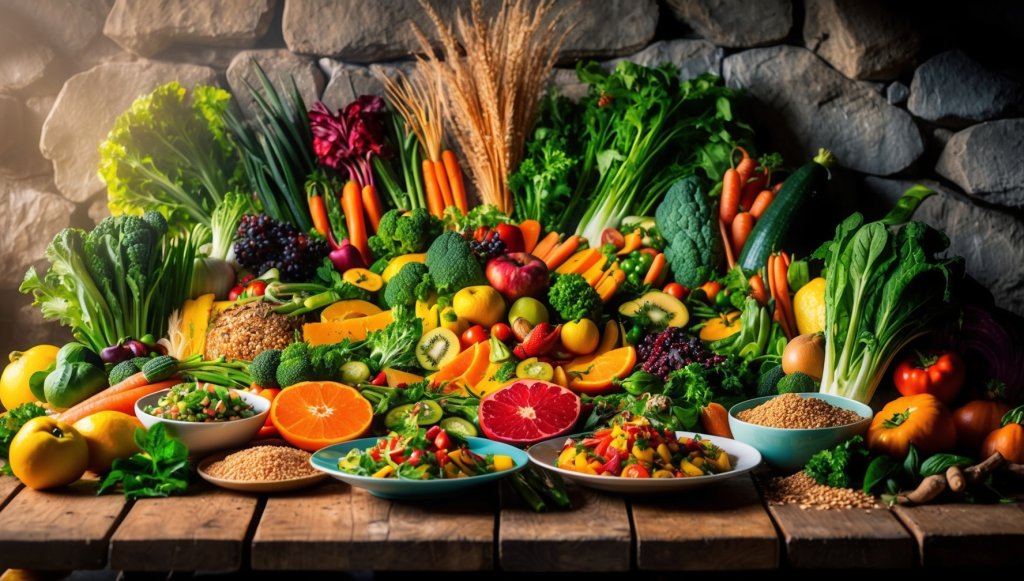The terms vegan and vegetarian often get used interchangeably, but they represent distinct dietary choices with unique principles and lifestyle implications. Both diets emphasize plant-based foods, yet their approach to animal products varies significantly. Here’s a closer look at the key differences between vegan and vegetarian diets, the motivations behind each, and the benefits they offer.
1. Definitions and Dietary Choices
- Vegetarian: Vegetarians exclude meat, poultry, and fish from their diets but often include animal by-products like dairy and eggs. This allows for a wide range of food options, from vegetables, fruits, grains, nuts, and seeds to milk, cheese, yogurt, and eggs. There are several types of vegetarians:
- Lacto-Vegetarians: Include dairy but not eggs.
- Ovo-Vegetarians: Include eggs but not dairy.
- Lacto-Ovo Vegetarians: Include both dairy and eggs.
- Vegan: Vegans avoid all animal products, including meat, dairy, eggs, and often honey. The vegan diet is strictly plant-based, with foods like vegetables, fruits, legumes, grains, nuts, and seeds forming the core of their meals. The vegan philosophy generally extends beyond diet to lifestyle choices, avoiding all products tested on animals or made from animal-derived materials, such as leather or wool.
2. Motivations Behind Each Diet
- Vegetarianism: People choose vegetarianism for various reasons, often balancing ethical concerns with health benefits. Common motivations include reducing harm to animals, minimizing environmental impact, and focusing on health benefits associated with plant-rich diets. Some vegetarians view their diet as a compromise, allowing for dairy or eggs as long as the primary sources of their meals remain plant-based.
- Veganism: Veganism is frequently rooted in ethical principles, aiming to eliminate all forms of animal exploitation and cruelty. Environmental sustainability is also a strong factor, as veganism helps reduce greenhouse gas emissions, land use, and water consumption linked to animal agriculture. Health can be an additional motivation, especially since vegan diets are often associated with lower cholesterol levels, lower blood pressure, and reduced risk of chronic diseases.

3. Health Benefits of Vegan and Vegetarian Diets
Both vegan and vegetarian diets, when planned properly, offer several health advantages:
- Reduced Risk of Chronic Diseases: Research suggests that both vegans and vegetarians have a lower risk of heart disease, hypertension, type 2 diabetes, and certain cancers. The high fiber intake from vegetables, fruits, whole grains, and legumes supports cardiovascular health and improves metabolic function.
- Weight Management: Plant-based diets tend to be lower in calories and fat, making them beneficial for weight management. Studies show that vegans, in particular, often have lower body mass indices (BMIs) than those on omnivorous diets.
- Improved Digestive Health: The high fiber content in both diets supports digestive health, promoting regular bowel movements and helping prevent conditions like diverticulitis and constipation.
4. Nutritional Considerations and Challenges
Both diets require careful planning to meet nutritional needs, as some nutrients are more abundant in animal products:
- Protein: Both vegans and vegetarians can meet their protein needs through foods like beans, lentils, tofu, and quinoa. However, vegans must rely exclusively on plant-based proteins, while vegetarians can also obtain protein from dairy and eggs.
- Vitamin B12: This vitamin is naturally found in animal products and is vital for nerve function and red blood cell formation. Since vegans do not consume dairy or eggs, they often need B12 supplements or fortified foods.
- Calcium: Vegetarians can obtain calcium from dairy, while vegans may need to focus on fortified plant milks, leafy greens, and supplements if necessary.
- Iron: Plant-based iron, or non-heme iron, is less easily absorbed than heme iron from meat, so both vegans and vegetarians should consume iron-rich foods like lentils, beans, and dark leafy greens alongside vitamin C-rich foods to enhance absorption.
5. Environmental Impact
Both vegan and vegetarian diets have a lower environmental footprint compared to diets rich in animal products. Reducing or eliminating meat and dairy can significantly decrease greenhouse gas emissions, water usage, and land degradation.
- Vegan Diet: Avoiding all animal products, veganism represents the lowest environmental impact, particularly when it includes locally sourced and minimally processed plant foods.
- Vegetarian Diet: While still significantly lower in environmental impact than omnivorous diets, vegetarianism may have a slightly higher footprint than veganism due to the resources required for dairy and egg production.

6. Lifestyle Implications
For many vegans, their dietary choice is part of a broader lifestyle. Veganism often extends to avoiding products like leather, wool, and cosmetics tested on animals. On the other hand, vegetarians may not necessarily follow such restrictions, though some do for ethical consistency.
Which Is Right for You?
Choosing between veganism and vegetarianism depends on personal values, health goals, and lifestyle. Both diets offer substantial health benefits, ethical advantages, and positive environmental impacts. Those interested in eliminating all forms of animal exploitation may find veganism aligns with their values, while others seeking a middle ground may find that vegetarianism provides a flexible and balanced approach.












